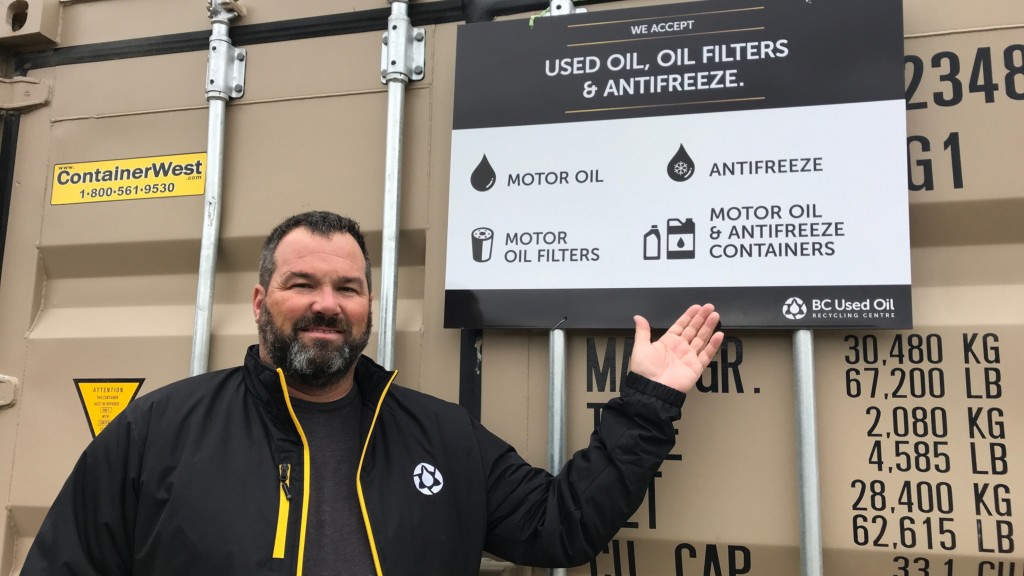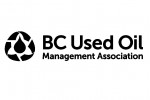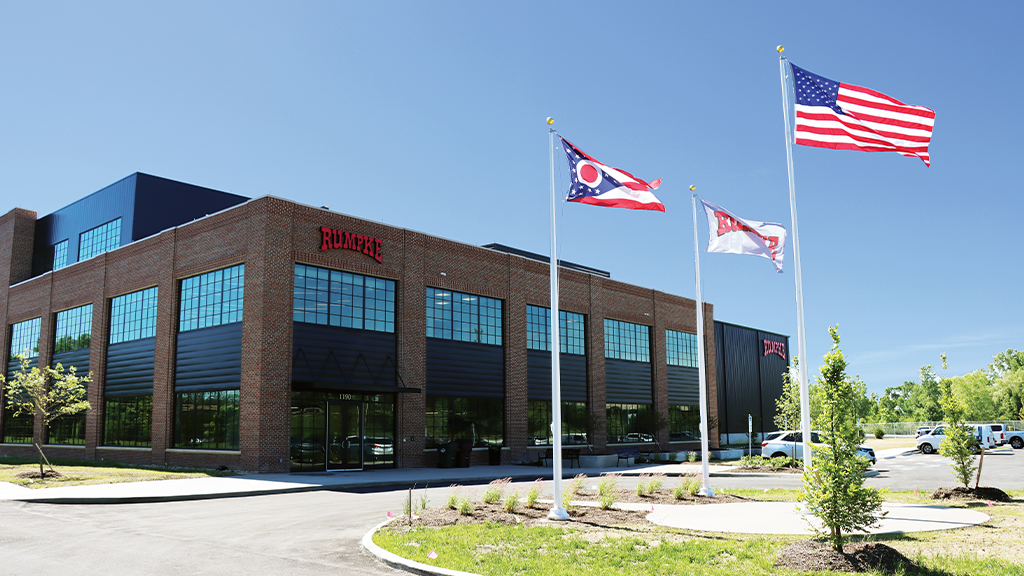Building the model for used oil recovery in B.C.
BCUOMA program is transforming the way we collect and responsibly manage used oil, antifreeze and filters

David Lawes (pictured above) has spent just over six years with the B.C. Used Oil Management Association (BCUOMA.) Prior to that, he was with the B.C. provincial government in the Ministry of Environment where he oversaw recycling programs and led the award-winning B.C. government team behind many of the recycling programs in place around the province today.
"The product stewardship policy approach that we have in British Columbia is considered world-class," says Lawes. "It's a results-based regulatory approach where government has put industry in charge of managing the products they make and sell, and then set high standards and reporting requirements. The government really doesn't get involved in the day-to-day operations of recycling businesses, instead it leaves that up to the business people that are running the take-back programs.
"I'm a British Columbian, so I'm pretty proud of what we've done here."
He says the model used in B.C. for managing used automotive and industrial oil and other fluids including antifreeze has been noticed across the country and in the U.S., but from a government perspective, the results-based model in BC can be hard to replicate in other jurisdictions.
"It takes a lot of trust in the quid pro quo equilibrium and braveness on behalf of government. Government needs to provide industry with the flexibility it needs to design and efficiently deliver these programs. Government then needs to keep laser focused on having the right metrics and regulatory provisions in place to make sure targets are being met, and the public interest is being served, but stay out of the operations."
How the B.C. used oil recycling model works
The BC Used Oil Management Association (BCUOMA) started in 2003, the same year the provincial government regulated that producers be put in charge of used automotive and industrial oil and fluids recycling. ("Producers" are the first sellers of products such as automotive oil and antifreeze, as well as oil filters, etc.)
BCUOMA's program enables the province-wide collection and recycling of lubricating oil, oil filters, oil containers, antifreeze and antifreeze containers. Since 2003, the used oil program has been expanded into all parts of the province. BCUOMA membership is currently at about 250 members, with first sellers of oil or antifreeze in British Columbia as its membership base. BCUOMA has a fee schedule for that membership, based on the volume they put into the market, or the weight they put into the market. The BCUOMA board consists of member nominated industry representatives from companies including Petro-Canada, Chevron, Canadian Tire and Mr. Lube.
"We are an open market, or free-market program," explains Lawes. "We don't contract out collection companies to go around to all the different lube shops, or Canadian Tires, or the municipal yards. We provide an incentive to all registered companies to collect used oil and other fluids and these companies make their own contracts with the generators.
"Companies in British Columbia that are registered with us must demonstrate they're doing the right thing, environmentally, with their products and meeting all the environmental regulations. We measure and monitor the amount of material collected, and then we provide a zone-based incentive.
"The further they are away from the major centres, the more we pay them," he continues. "We want to make sure oil and antifreeze is collected through the entire province. They bring it into a recycling facility, where it is processed and eventually re-marketed. Our incentive is really just to make sure that material moves from all parts of the province, and that enough companies involved in the business are staying viable and competitive."
He adds that British Columbia is fortunate with respect to end market availability for recovered oil, as one of Canada's largest re-refineries of oil, is located in North Vancouver.
"On average, 75 percent of the oil that's collected in British Columbia gets turned back into new lubricating oil, and is reused again and again," he says, adding that all the antifreeze collected also gets turned back into new antifreeze products.
"Lots of times, antifreeze is going right back into use, it's being distilled and it goes right back into the car."
He says used oil filters also contain steel, for which there is established markets and that most of the plastics recovered from their programs go to Merlin Plastics located in Delta, B.C., outside of Vancouver.
"Most of our recovered plastics go to Merlin Plastics, one of the best plastic recycling facilities in the Pacific North West of North America," he says. "Our recovered plastics are cleaned and turned into new pellets, and sold back to the plastics industry."
Our filter and container recovery rates on average, typically near 85 percent, are quite high compared to other jurisdictions in North America.
The modified sea container solution for used oil collection
Outside of commercially and industrially generated oil, lubrication fluids, antifreeze and containers collected, there is a need for the collection of DIY-generated oil, antifreeze, other fluids and containers, coming from the public and residential sources.
To provide consumers with convenient options to recycle their oil BCUOMA works with recycling depots, auto repair shops, quick lube stations, local government and others to provide a network of nearly 300 locations across BC. For the last three years the BCUOMA program has been implementing a program that brings used oil collection infrastructure to public return sites, often in the more remote locations in the province through community partnerships.
These partnerships often result in the delivery of a modified sea-container, fully equipped for the collection of used oil, antifreeze and filters. This "turnkey" infrastructure can be placed in an optimal location in a community and can be easily moved if needed.
With the sea container program, Lawes says their data indicates they are collecting about two million litres of oil and about a half a million litres of antifreeze every year from public drop offs.
"It sounds like a huge number, but the total amount of oil and antifreeze we manage is 50 million litres per year through our commercial program," he explains. "However with the sea containers, we are talking about two million litres that is really hard to get, and it can cause the most damage to the environment. This is why we're investing so much into this area."
The genesis of the sea container program he says was a few years ago when the BCUOMA started looking closely at their collection network, consulting with all stakeholders, and needing to make sure it was serving consumers in all regions in British Columbia, including do-it-yourselfers (DIY).
"We found that we had a whole bunch of facilities around the province, but many were small without the proper infrastructure, where the potential for spillage and contamination was high. We developed our new program so that we have less facilities, but better facilities."
He says during their preliminary research to see how hazardous waste was managed by companies they found a few good examples, including at BC Hydro, where they were using steel sea containers modified with a spill tray. "We took this to the next level," says Lawes. "We partnered with an engineering company and a sea container manufacturer in Richmond, B.C., and really tweaked the design to suit used oil and antifreeze recycling. We then worked on signage, to make it easy for DIYers and regular people [outside of a commercial and industrial environment] to understand how to properly recycle used oil and antifreeze."
We really have a strong team working on this program. Will Burrows, who previously worked for the Coast Waste Management Association is leading the sea-container program and teaming up with our Director of Communications, Kelly Duran, who previously worked for the Canucks and the BC auto industry. We also have Get Smart, a boutique IT firm, managing the administration of the program.
Lawes says that as CEO my role is easy as I just have to hire great people and empower and support them to do great things. He says their modified sea containers are fully contained, with proper spill containment and venting, so that the area and neighbours will be less concerned with having hazardous material collection infrastructure in their community. Units are also built for quick, easy setup in any location.
"When a local government or a retailer says they would like a 20-foot or a 10-foot, or six-foot sea-container for used oil recycling delivered to their site, we've got a pathway, we can get it delivered and put it out there really quickly. It doesn't require months or a year of construction like many projects."
Lawes says their program is growing fast, with about 60 different installations of modified sea-container used oil collection facilities currently set up in B.C., and we are hoping to add about 20 more in 2020.
Working with first nations partners
In 2018, the Indigenous Zero Waste Technical Advisory Group (IZWTAG) was created. This indigenous led non-profit society are dedicated to environmentally-responsible waste management. IZWTAG provides technical support, resources, training services and to all First Nation communities. In their efforts to be stewards of the land and the environment, IZWTAG is an organization that develops skilled and accomplished operators, helps with practical advice on installing, operating and maintaining waste management systems and advancing zero waste education and best practices for First Nation communities. The chair is Calvin Jameson Public Works Superintendent at Lil'wat Nation in Mount Currie.
"IZWTAG work with all of the First Nations communities in B.C. and it was a natural fit for BCUOMA to become the first industry stewardship association to sign up as a partner. We're partnering to do remote community clean-ups. We just did one in the summer of last year working with the Hesquiaht First Nation at Hot Springs Cove."
On this project, he says they used a barge to get the appropriate equipment and infrastructure into Hot Springs Cove, a small community north of Tofino on the West Coast of Vancouver Island where they use a generator to provide all the electricity for their remote community.
"They were diligent in changing the oil, but they had a whole bunch of it and that volume was piling up, and they had no options for it. We worked with them to get it taken care of."
By the end of this project, BCUOMA removed 3,500 litres of used oil, 160 used oil filters and 150 x 20 litre empty oil pails and lids. They also provided long-term infrastructure as well as on-site training to the Hesquiaht First Nation to ensure future used oil materials are safely stored and free of contamination.
"For me, this is a really exciting area, and I'm happy that this First Nations group have stepped up and created this new association to make it really easy to work on projects together."
In a previous role I spent 3 years working for a US Indian Tribe, the Makah Tribe, working on environmental and natural resource projects, where I lived in the community and developed an appreciation for the culture and needs of a remote Pacific Coast native community.
According to Lawes, as the very first Associate Member of IZWTAG, BCUOMA is going to do its part to support all of the group's efforts.
"We look forward to working with IZWTAG to support their success, which will we believe will in turn help us ensure that used oil and other BCUOMA program products are safely collected from First Nation communities and responsibly recycled." RPN
This article was originally published in the March 2020 edition of Recycling Product News, Volume 28, Number 2.



